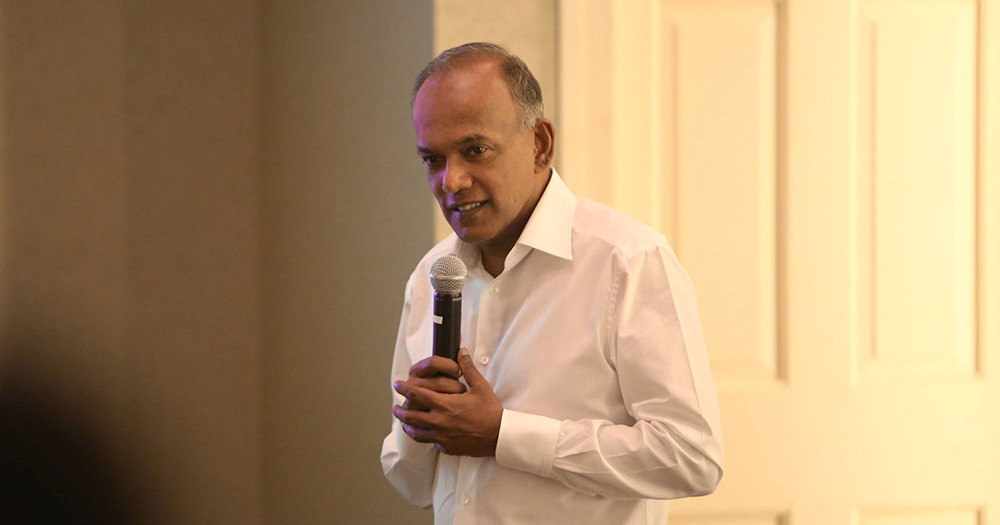Here's a couple of things Singaporeans need to know about higher profile executions and the strictness of Singapore's laws.
Singapore does not accede to Malaysia's request for leniency
Malaysia has appealed multiple times for Singapore not to hang its citizens who had committed capital offences, but it would not be possible to accede to these requests because it goes against Singapore's due process.
This was what Minister for Law and Home Affairs K Shanmugam revealed on Friday, May 24, at a workplan seminar for Central Narcotics Bureau (CNB) officers at the Home Team Academy, Today and CNA reported.
Malaysia's anti-death penalty stance
Shanmugam also said Malaysia’s Pakatan Harapan (PH) government is ideologically opposed to the death penalty.
Since it came to power in May 2018, the PH government has made appeals to Singapore for clemency in three death penalty cases -- two of which were drug trafficking cases.
Requested mutual respect
But there is a need for mutual respect for each government's position, Today reported Shanmugam saying.
“The PH government, some ministers in particular, are ideologically opposed to the death penalty and we have to respect their position,” he said.
“At the same time, we do impose a death penalty in Singapore, and I expect that Malaysia will respect that position as well.”
Respect for due process too
A respect for due process also makes it not possible for the Singapore government to oblige appeals from Malaysia.
Doing so would contravene the due process of Singapore's courts.
Two cases involved drug traffickers
Shanmugam shared that of the three appeals made, two involved drug trafficking cases.
This included the recent case of 31-year-old Pannir Selvam Pranthaman, who was granted a last-minute stay of execution on May 23, a day before he was due to hang on Friday morning.
Singled out Malaysia minister
Shanmugam said that Malaysia minister Liew Vui Keong wrote a letter to the Singapore government to appeal on Pannir's behalf.
Liew is a Minister in the Prime Minister's Department and he is also in charge of law and parliamentary affairs.
The other two cases likely referred to the execution of murderer Michael Anak Garing from Sarawak on March 22, 2019, and the execution of drug trafficker Prabu N. Pathmanathan on October 26, 2018.
Michael's case also involved Malaysian Prime Minister Mahathir Mohamad, who said that Malaysia would attempt to save the Sarawakian.
Government won't intervene in court decisions
Shanmugam said it was not possible for the Singapore government to intervene if there was no legal reason to do so, regardless of the number of requests made.
He said, according to Today:
"When there are no legal reasons for us to intervene and the courts have imposed a sentence, we will not intervene, as a government."
Malaysian authorities should arrest drug traffickers
Shanmugam added that he would reply to Liew with suggestions, such as arresting traffickers before they enter Singapore, so that they will not have to have to face the death penalty here.
He also said he will ask Liew to provide statistics on the number of drug traffickers the Malaysian authorities picked up at their border, given the number of Malaysians that manage to enter Singapore with drugs.
Shanmugam said he assumed the Malaysians also had strict laws on drugs, good border control, and the intention and will to enforce the restrictions like Singapore.
"Dealer in death"
Shanmugam provided some statistics to show that Malaysians in 2018 accounted for nearly 30 percent of the total traffickers caught and heroin smuggled.
This made it hard to be lenient towards Malaysians who account for a sizable amount of illegal drugs seized by Singapore authorities.
Shanmugam pointed out:
"One in five traffickers who brought in amounts that attracted the death penalty, above the threshold -- Malaysians. How do we go easy on Malaysians in the face of these stats?"
He added that should Singapore go easy, the rule of law will become a joke and stressed each trafficker was also a "dealer in death".
Malaysia also should arrest drug kingpins
Malaysia could also take the step of arresting drug kingpins "who are too scared to come to Singapore", Today further reported.
Shanmugam praised the Malaysian agencies for cooperating well with Singapore, and said they should be given support.
It was also in the interest of both countries for Malaysia to publicise Singapore's tough stance on drugs, Shanmugam said.
He noted that many drug trafficking groups were predominantly poor and less-educated Indians, who were willing to commit crimes in Singapore for just a few hundred Malaysian ringgit.
Shanmugam said the drug trafficking situation could be improved if the consequences of trafficking drugs in Singapore were clearly laid out.
Death penalty imposed because evidence shows that it works as a deterrent
As for Singapore's stance on the death penalty, Shanmugam said that it was done not from any ideological standpoint, but because there was evidence that showed it worked as a deterrent, Today highlighted.
He pointed out that the use of capital penalties for drugs saved lives, as countries with more lax drug laws had seen a rise in the loss of life through violent crime stemming from drug trade and consumption.
For the case of the Malaysians, Shanmugam stated:
"It is not tenable to give a special moratorium for Malaysians and impose it on everyone else, including Singaporeans, who commit offences which carry the death penalty."
Related story:
Top image from K Shanmugam Facebook.
If you like what you read, follow us on Facebook, Instagram, Twitter and Telegram to get the latest updates.
